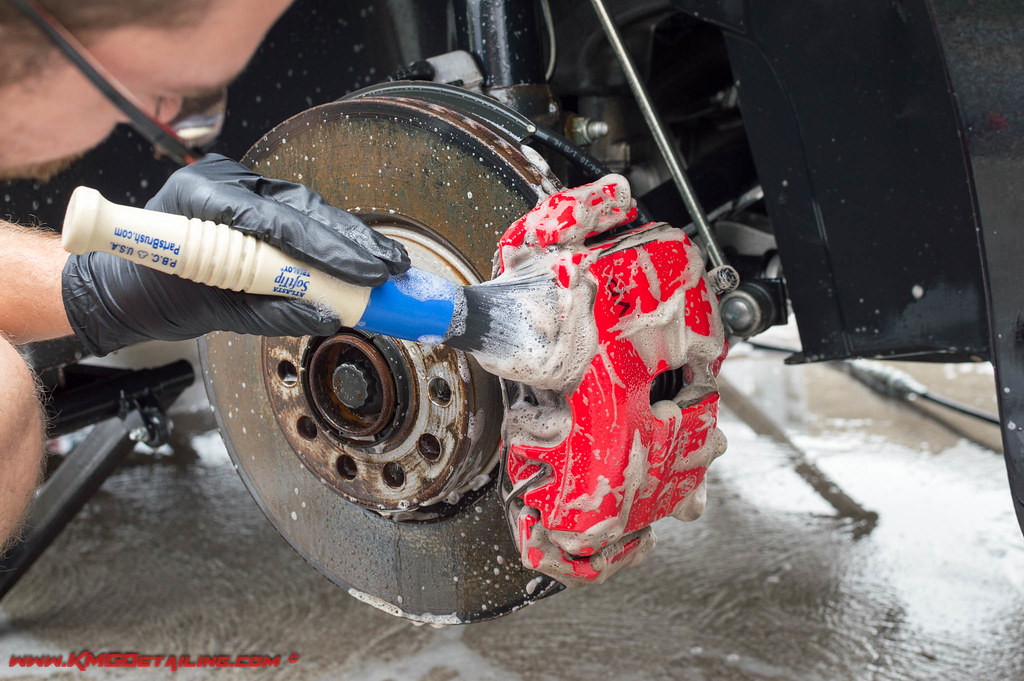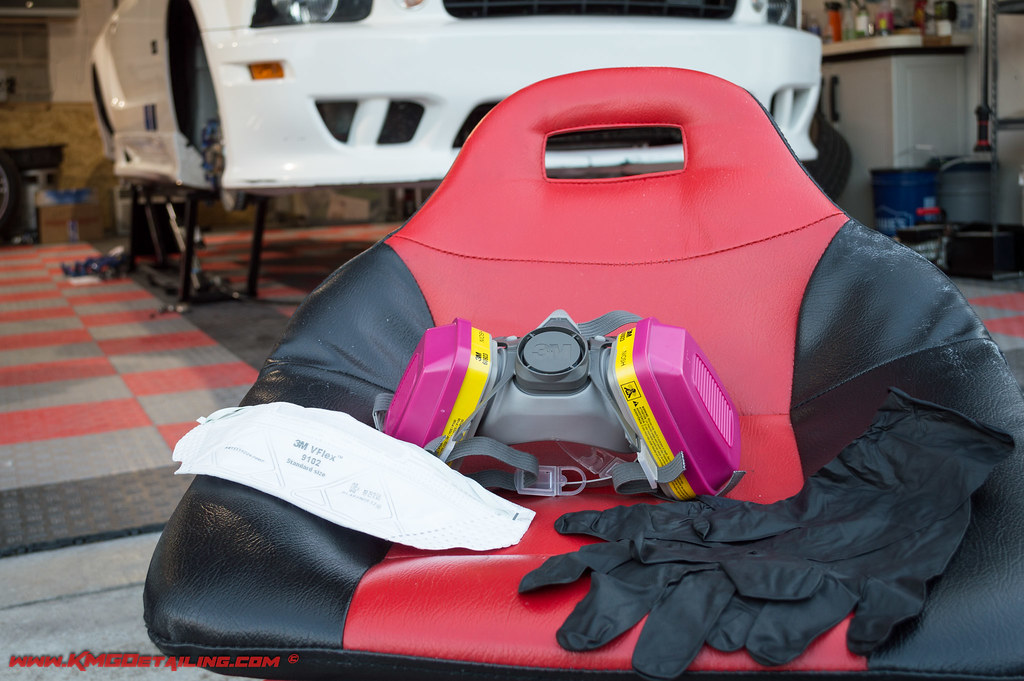Working Safely with Chemicals
by Kevin GeorgeWorking in the detailing industry, as a professional or a hobbyist working only on your own vehicles. You are going to be exposed to a variety of chemicals ranging from liquids to vapors. It is very important to properly protect yourself while working with or around these chemicals. In some cases, issues caused by repeated exposure to chemicals will not show up for lengthy period of time. It is critical to be aware of the chemicals you’re dealing with. It would be a good idea to keep or at least look at the MSDS sheet (Material Safety Data Sheet) for the chemicals you keep on hand or deal with on a regular basis. The MSDS sheet will provide important information regarding the chemical you are dealing with, including toxicity, storage, health effects, protective equipment that should be used and quite a bit of other useful information.

You should always wear a good pair of gloves when you are handling chemicals, as they do more than keep your hands clean. While chemical exposure may not be harmful immediately, repeated exposure may lead to serious health issues that will vary depending on the chemicals you have been exposed to. The Premium Black Latex Gloves available through Detailed Image work great when working with most of the chemicals we deal with on a regular basis. These gloves are heavier and more durable then gloves you can buy at most of the big box stores, the fingers are constructed to a .7 mil thickness and meet the ASTM D3578-99 standard which is the standard specification for rubber examination gloves. Unlike most latex gloves I have used in the past, you can use these gloves multiple times without them tearing.

Depending on the chemicals you are using, wear long sleeves when using some chemicals such as wheel acids or other strong chemicals that can irritate your skin if using outdoors on windy days, as the product could blow back on your skin or even worse into your eyes. While I am sure very few of us wear safety glass while working, it is always a good idea to be aware of the conditions that you will be working in. If you are working outside on a windy day be smart, avoid touching at your face or around your eyes and always try to spray in the direction the wind is blowing so the product is not blowing back on you.
This is just beginning to scratch the surface of precautions to take while doing work. While it may not seem like it, you are around and handling many chemicals which can have longer term effects on your health. Be smart about how you are working now, as it could very well effect how you are able to work in the future.









Safety is an issue that takes a while to grasp, usually until an accident happens rendering someone with an incapacitating injury. The MSDS (material Safety data Sheets)are easy to compile in a book and kept handy to review so you are aware on treatment for exposure to certain chemicals. Most MSDS sheets can be found online. The MSDS sheets will also advise you on proper PPE (personal protection equipment) required. Keeping a portable eyewash satiation in your area of work is always a good idea. Buffers/Polishers; chose a machine that feels right in size and weight for you. Remember the pad and abrasive is what is going to do the work, you don’t need a model which is going to give you a rotator cup injury. Take breaks review your work don’t be in a hurry and keep hydrated summer is here. Good luck with your projects.
Good feedback Arthur! Your comments about choosing the right tool is in line with one of my previous articles “Having the right tool for the job”. Thanks for your input.
I would like some recommendations on respirators. Will you expand on this article?
John, for the type of work we do you can get away with going to your local Lowes or Home Depot and purchase a respirator there. That is where I purchased the one shown in the picture that I use which will be just fine for the type of work I do.
Very important topic, Kevin. Thanks for taking the time to write this!
Having been polishing cars for over 25 years now and not wearing PPE for the majority of those years, I have developed some significant respiratory issues, which are most certainly as a result of long term expose to some of these chemicals. The polishes and compounds today are better then the “silica sand in a bottle” compounds we used back in the day but users should still be wearing protection. A few months ago I started noticing my breathing getting significantly worse after a polishing session, almost asthma like, and I’ve been wearing respirators ever since and the issue has stopped. I’ve tried a few different ones now and finding the right size and one that fits your face is very important. You also want to be sure it’s the right type of mask for the chemical you are working with.
I think John’s recommendation to expand on this article is a great idea.
Here is the polishing respirator I’m using now after trying a few and it seems to fit my face best and is less bulky then some of the others I’ve tried.
http://www.gvs.com/flex/cm/pages/ServeBLOB.php/L/EN/IDPagina/460
For coating applications I’ve been using this one.
http://products3.3m.com/catalog/ca/en001/auto_marine_aero/-/node_GSM9X9889Zgs/root_VJ3G0N3T7Ngv/vroot_G75KJBMR4Kge/bgel_NV4S784M8Mbl/gvel_MF3FPDWFGRgl/theme_ca_en_automarineaero_3_0/command_AbcPageHandler/output_html
Rasky
Chad, thanks! Some of this Si02 coatings are pretty gnarly to deal with.
Hello Sir
I work for the Feds and ppe is a mandatory thing for us. I run a part time detailing business. I have noticed that many detailer do not wear any protection for thier eyes or hearing. I would think that when buffing out a car with a noisy buffer you would want to protect your hearing and eye sight by wearing safety glasses.
Kevin,
Fantastic article. In the fire service, we do FIT testing each year to ensure our SCBA’s and any other respirators are sized properly. Cancer is a big issue for firefighters, as you can imagine.
Chad,
Thanks for the links.
Steve